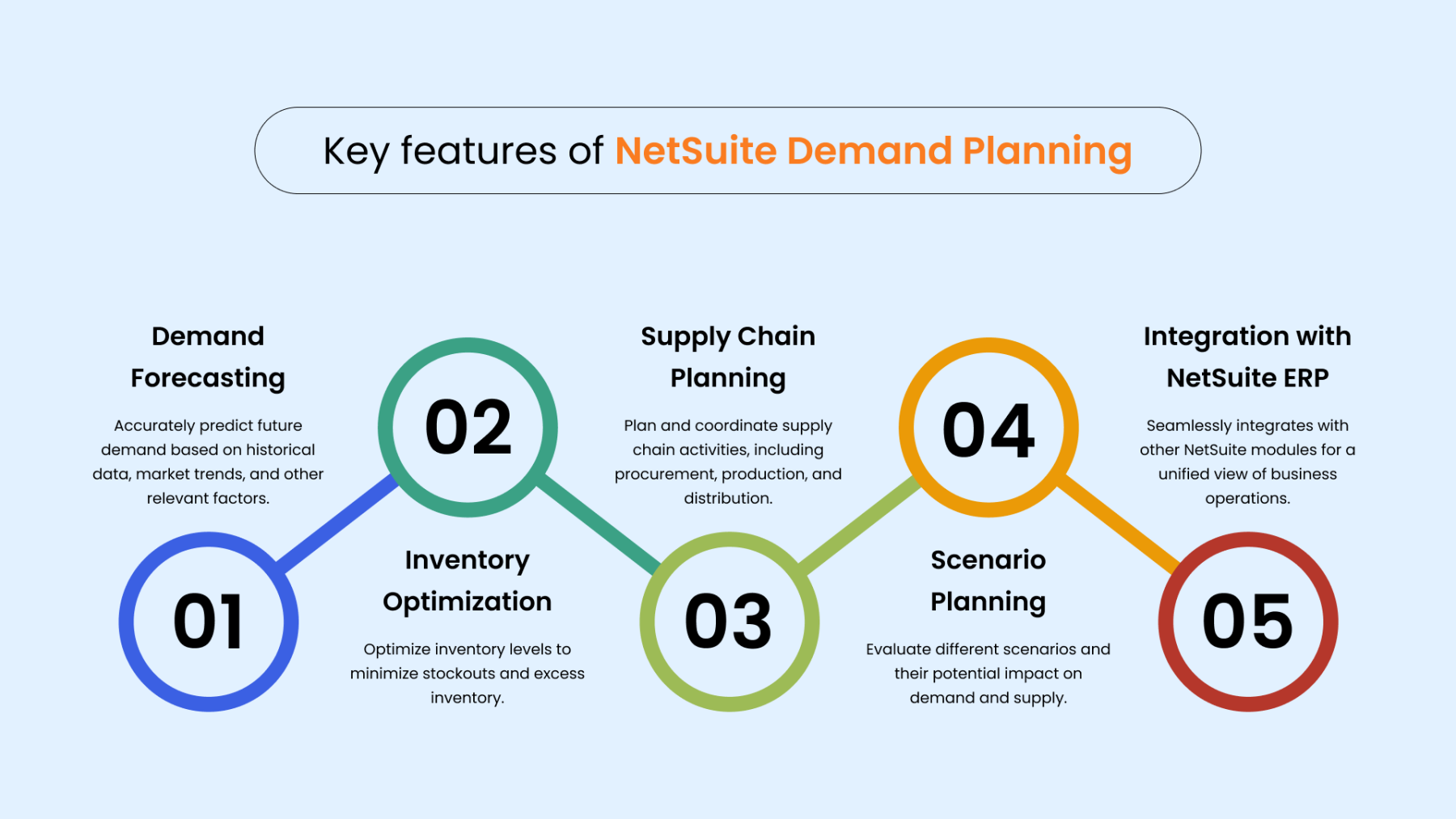Inventory management is a critical function for businesses across industries. Inefficient inventory management can lead to stockouts, excess inventory, and increased costs. NetSuite Demand Planning, a powerful tool within the NetSuite ERP suite, offers a solution to these challenges by providing advanced demand forecasting and planning capabilities. This blog explores the benefits of NetSuite Demand Planning, its key features, and best practices for implementation.
Understanding NetSuite Demand Planning
NetSuite Demand Planning is a comprehensive solution that helps businesses accurately forecast demand, optimize inventory levels, and improve supply chain efficiency. It leverages advanced analytics, statistical modeling, and machine learning to provide actionable insights.
Key features of NetSuite Demand Planning:
-
Demand Forecasting: Accurately predict future demand based on historical data, market trends, and other relevant factors.
-
Inventory Optimization: Optimize inventory levels to minimize stockouts and excess inventory.
-
Supply Chain Planning: Plan and coordinate supply chain activities, including procurement, production, and distribution.
-
Scenario Planning: Evaluate different scenarios and their potential impact on demand and supply.
-
Integration with NetSuite ERP: Seamlessly integrates with other NetSuite modules for a unified view of business operations.
Benefits of Using NetSuite Demand Planning
-
Improved Inventory Accuracy: Reduce stockouts and excess inventory, leading to cost savings.
-
Enhanced Customer Satisfaction: Ensure product availability and reduce lead times.
-
Optimized Supply Chain: Improve supply chain efficiency and responsiveness.
-
Data-Driven Decision Making: Make informed decisions based on accurate demand forecasts.
-
Reduced Costs: Minimize costs associated with inventory holding, stockouts, and expedited shipping.
Implementing NetSuite Demand Planning
-
Data Collection and Preparation: Gather historical sales data, market trends, and other relevant information.
-
Model Creation: Develop demand forecasting models using NetSuite Demand Planning's built-in tools.
-
Scenario Planning: Create and analyze different scenarios to assess potential outcomes.
-
Inventory Optimization: Use demand forecasts to optimize inventory levels and reorder points.
-
Integration with Other Systems: Integrate NetSuite Demand Planning with other systems, such as ERP, CRM, and supply chain management tools.
Best Practices for NetSuite Demand Planning
-
Data Quality: Ensure the accuracy and completeness of your historical data.
-
Model Validation: Regularly validate and refine your demand forecasting models.
-
Collaboration: Foster collaboration between sales, operations, and finance teams.
-
Continuous Improvement: Continuously monitor and refine your demand planning processes.
-
Leverage Advanced Features: Utilize features like statistical forecasting, collaborative planning, and scenario modeling.
Advanced Features and Functionality
NetSuite Demand Planning offers advanced features to enhance its capabilities:
-
Machine Learning: Leverage machine learning algorithms for more accurate demand forecasting.
-
Scenario Planning: Create and analyze multiple scenarios to assess risk and uncertainty.
-
Supply Chain Collaboration: Collaborate with suppliers and customers to improve supply chain visibility and efficiency.
-
Integration with Other Modules: Seamlessly integrate with other NetSuite modules for a unified view of business operations.
Challenges and Considerations
-
Data Quality: Ensure the quality and accuracy of your historical data.
-
Complexity: Implementing and managing demand planning can be complex, especially for large organizations.
-
Change Management: Effectively manage change within your organization to ensure adoption of new processes.
-
Customization: Customize NetSuite Demand Planning to meet your specific needs and industry requirements.
Conclusion
NetSuite Demand Planning is a powerful tool for optimizing inventory management and improving supply chain efficiency. By leveraging its advanced features and best practices, organizations can achieve significant cost savings, enhance customer satisfaction, and drive business growth.
How Techwize Can Help
Techwize, with its expertise in NetSuite and supply chain management, offers comprehensive services to assist organizations in leveraging the power of NetSuite Demand Planning:
-
Implementation and Configuration: Our experts can help you implement and configure NetSuite Demand Planning to meet your specific requirements.
-
Data Migration and Integration: We can assist in migrating your existing inventory data and integrating NetSuite Demand Planning with other systems.
-
Demand Forecasting: Our team can help you develop accurate demand forecasting models.
-
Inventory Optimization: We can optimize your inventory levels and reorder points.
-
Supply Chain Planning: We can assist in planning and coordinating your supply chain activities.
-
Training and Support: Our experts can provide training and ongoing support to ensure successful adoption and utilization of NetSuite Demand Planning.
By partnering with Techwize, you can accelerate your implementation of NetSuite Demand Planning, optimize your inventory management processes, and drive significant cost savings.
Let Techwize be your trusted partner for inventory optimization and supply chain efficiency.



